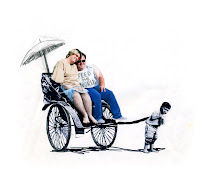This is the exact problem of the human condition: emotions, unregulated by reason, masquerade as truth. We think because we experience a particular feeling that it necessarily exists out in the world, outside of our mind; but this is often not the case. There are plenty of ways this could occur, but for the average human being the main environment is interpersonal relationships. This is a place full of fog and cliffs in every direction. I feel like I'm wrong nearly all the time. Every time I fall it is completely shocking, it's like I act with no body of previous experience to reflect on. That's alright, I think. Yeah, life is easier when we base the future on the past, but it seems this ease is also problematic.
To use Hume's example, I am not suggesting that one should doubt the sun will rise tomorrow in the face of all empirical knowledge. The assumption that the sun will rise again every morning permeats our existence. How would we live our lives if we doubted tomorrow's existence? For me, that is right up there with Nietzche's Eternal Recurrence of the Same (we should live our life as if we would be repeating the same exact life course for eternity) and Sartre's thought that the ethical life can be found by the individual in the question of universalization (What would be the effect of everyone acting as I act?) I guess a criticism of my question might be that it borders on the cliched "live today, like you're gonna die tomorrow." I think this is a fair point, however, it doesn't detract from the power of my statement in view of human being's lack of urgency. We are here for a limited amount of time and are blessed by nature with the ability to be aware of it. Shouldn't that be a propulsion for people to live well? An 'ought' does not an 'is' or 'must' make. Ideally, this would be case but if we're honestly trying to give an accurate picture of human behavior, it is far too idealistic. It assumes that people have enough self-knowledge to know when they are bullshitting, rationalizing, entering the spin zone, whatever you want to call it. Inside our own minds the craziest shit can seem to be true, and the next day we can believe the exact opposite! It is not easy.
Should convenience ever be involved in major discussions? When choosing which Jewel to go to, this is a perfect standard. If both Jewels are equal in everything else of value, then it's a no brainer: pick the most convenient location. And that's fine. There is no reason to waste time here with meaningless analysis. If everything is equal, most people will choose the closer store. But what about in matters of interpersonal relations or substantial life decisions? Should we do whatever is easiest, ignoring voices imploring us to explore a more difficult course of change? The answer has nothing to do with these questions. We should do what we think is right without regard for ease or difficulty. How do we decide the right course? (Hint: There's no formula) And how is this related to where I started with misleading emotions?
Oh yeah. Emotion must obey Reason. See Aristotle's Ethics.
There seems to be also another irrational element in the soul -- one which in a sense, however, shares in a rational principle. For we praise the rational principle of the continent man and of the incontinent, and the part of their soul that has such a principle, since it urges them aright and towards the best objects; but there is found in them also another element naturally opposed to the rational principle, which fights against and resists that principle. For exactly as paralysed limbs when we intend to move them to the right turn on the contrary to the left, so is it with the soul; the impulses of incontinent people move in contrary directions. But while in the body we see that which moves astray, in the soul we do not. No doubt, however, we must none the less suppose that in the soul too there is something contrary to the rational principle, resisting and opposing it. In what sense it is distinct from the other elements does not concern us. Now even this seems to have a share in a rational principle, as we said; at any rate in the continent man it obeys the rational principle and presumably in the temperate and brave man it is still more obedient; for in him it speaks, on all matters, with the same voice as the rational principle.
Therefore the irrational element also appears to be two-fold. For the vegetative element in no way shares in a rational principle, but the appetitive and in general the desiring element in a sense shares in it, in so far as it listens to and obeys it; this is the sense in which we speak of 'taking account' of one's father or one's friends, not that in which we speak of 'accounting for a mathematical property. That the irrational element is in some sense persuaded by a rational principle is indicated also by the giving of advice and by all reproof and exhortation. And if this element also must be said to have a rational principle, that which has a rational principle (as well as that which has not) will be twofold, one subdivision having it in the strict sense and in itself, and the other having a tendency to obey as one does one's father.

1 comment:
i feel like this is a thick, detailed description of paranoia...perhaps u should add a link to a live version of paranoid android (at least for my listening pleasure)...
Post a Comment